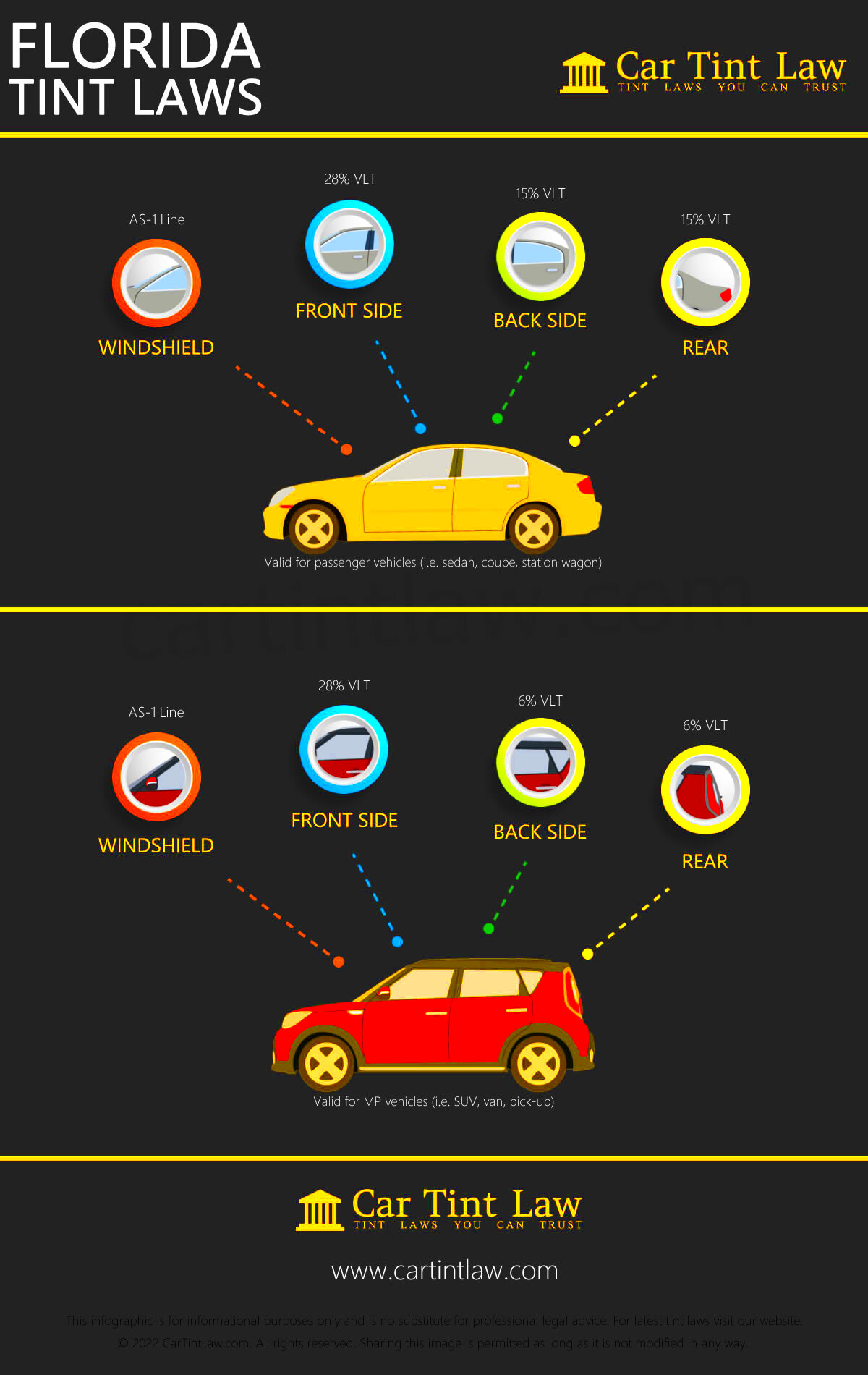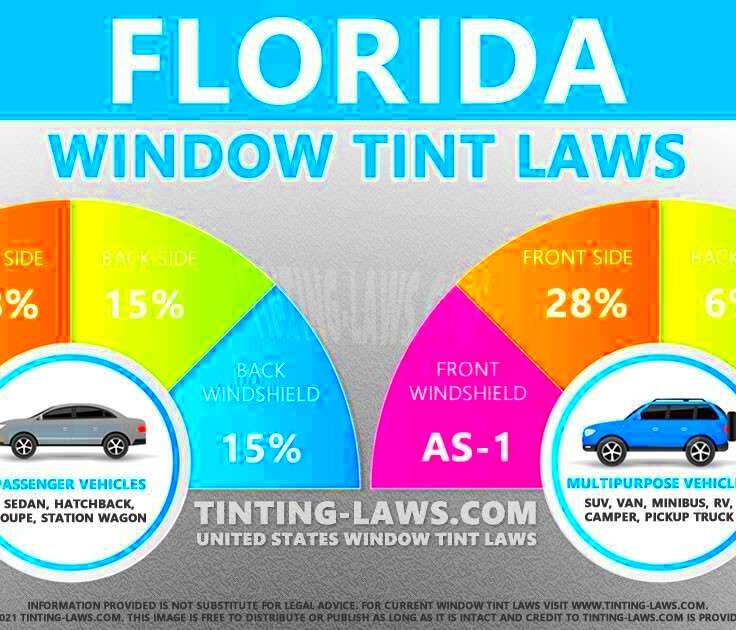Florida Tint Laws in 2024 What You Need to Know
Florida has specific laws regarding window tinting that every vehicle owner should be aware of. These laws are in place to ensure safety and visibility for all drivers. As you consider adding tint to your vehicle, it’s important to understand these regulations to avoid fines and ensure compliance. In this post, we’ll explore the key aspects of Florida’s tint laws, helping you make informed decisions about your vehicle’s window tinting.
Understanding Window Tinting Regulations

Window tinting regulations in Florida are designed to enhance safety and protect vehicle occupants from harmful UV rays. Here are some key points to consider:
- Visibility Standards: Florida law mandates specific visibility percentages for tinted windows to ensure that drivers have a clear view of the road.
- Medical Exemptions: Individuals with certain medical conditions may qualify for exemptions allowing darker tints.
- Type of Vehicle: Different rules may apply to passenger cars, vans, and SUVs, making it essential to know your vehicle type.
By adhering to these regulations, you can enjoy the benefits of window tinting while staying within legal limits.
Legal Tint Limits for Different Windows
Florida has established specific tint limits based on the type of window in your vehicle. Here’s a breakdown of the legal tint percentages:
| Window Type | Legal Tint Limit |
|---|---|
| Front Windshield | Top 6 inches must allow at least 70% light in |
| Front Side Windows | Must allow at least 28% light in |
| Back Side Windows | No restrictions on tint percentage |
| Rear Window | No restrictions on tint percentage |
Understanding these limits is crucial for any vehicle owner looking to tint their windows legally. Always consult with a professional installer to ensure compliance with Florida’s tint laws.
Exceptions to the Tint Laws
While Florida has strict tinting regulations, there are a few exceptions that can help certain individuals. Understanding these exceptions is crucial for those who may need darker tints for medical reasons or specific vehicle types. Here are the main exceptions:
- Medical Exemptions: If you have a medical condition that requires additional protection from sunlight, you may qualify for a medical exemption. This typically involves submitting a physician’s statement to the Florida Department of Highway Safety and Motor Vehicles.
- Commercial Vehicles: Some commercial vehicles, such as limousines or buses, may have different tint regulations. These vehicles often have tinted windows to provide privacy and comfort for passengers.
- Specialized Equipment: Certain vehicles equipped for law enforcement or emergency services may have different tint regulations due to their specific operational needs.
Always check with local authorities or a legal expert to ensure you’re following the correct procedures to obtain any exemptions. This way, you can stay compliant while still enjoying the benefits of tinted windows.
Penalties for Violating Tint Regulations
Violating Florida’s tint laws can lead to various penalties, which can be quite inconvenient for vehicle owners. It’s essential to be aware of these consequences to avoid potential fines. Here’s what you should know:
- Fines: If you’re pulled over for illegal tint, you could face a fine. The amount varies but can range from $100 to $500, depending on the severity of the violation.
- Corrective Action: In some cases, law enforcement may require you to remove the illegal tint before you can continue driving your vehicle.
- Points on License: Certain violations can also result in points being added to your driving record, which could affect your insurance rates.
To avoid these penalties, always ensure that your vehicle’s window tint complies with the law. If you’re unsure about your current tint, consider having it checked by a professional.
How to Properly Tint Your Vehicle
If you’ve decided to tint your vehicle, it’s important to do it correctly to stay within the legal limits and ensure quality results. Here are some steps to follow:
- Choose the Right Tint: Research the types of window tints available. Look for products that meet Florida’s legal standards for light transmission.
- Find a Reputable Installer: Opt for a professional installer who has experience with Florida’s tint laws. Check reviews and ask for recommendations.
- Get a Quote: Before the installation, obtain a quote and ensure you understand the costs involved. This includes any potential fees for using specialized materials.
- Review Your Tint: After installation, check that the tint complies with the legal limits. You can do this using a light meter, or have a professional confirm it for you.
Properly tinting your vehicle not only enhances its appearance but also helps you avoid legal issues down the line. Take your time to choose the right products and professionals for the best results.
Frequently Asked Questions about Florida Tint Laws
When it comes to window tinting in Florida, many vehicle owners have questions. Here are some of the most frequently asked questions that can help clarify common concerns:
- What is the legal tint percentage for my car?
The legal limits vary by window type. For example, front side windows must allow at least 28% light in, while back side windows and the rear window have no restrictions. - Can I get a darker tint if I have a medical condition?
Yes, individuals with certain medical conditions may qualify for a medical exemption, allowing for darker tint. You’ll need a physician’s note and may have to apply for the exemption through the state. - What happens if I get pulled over for illegal tint?
You could face a fine ranging from $100 to $500 and may be required to remove the illegal tint before being allowed to drive your vehicle again. - Can I install tint myself?
While DIY tint kits are available, it’s best to hire a professional installer. This ensures compliance with the law and better quality results. - Are there different laws for commercial vehicles?
Yes, commercial vehicles often have different tint regulations due to their specific needs, so it’s important to check the applicable laws.
Understanding these common questions can help you navigate Florida’s tint laws more effectively and ensure compliance.
Conclusion and Final Thoughts
Staying informed about Florida’s tint laws is crucial for every vehicle owner. By understanding the regulations, knowing the exceptions, and ensuring your vehicle is properly tinted, you can enjoy the benefits of window tinting without facing legal issues. Always consult with professionals and stay updated on any changes in the law to ensure you remain compliant.


